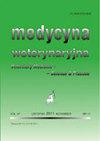马郁兰和百里香精油在家禽肉丸中的抗菌活性
IF 0.4
4区 农林科学
Q4 VETERINARY SCIENCES
Medycyna Weterynaryjna-Veterinary Medicine-Science and Practice
Pub Date : 2023-01-01
DOI:10.21521/mw.6810
引用次数: 0
摘要
这项研究的目的是评估使用马郁兰和百里香精油抑制家禽肉丸中微生物生长的可能性。第一阶段采用连续二倍稀释法测定其对10种病原菌的最低抑菌浓度(MIC)。在下一阶段,对评价委员会对气味和味觉的接受程度进行了测试,并对添加马乔兰和百里香精油的鸡肉肉丸进行了微生物总数和精神营养微生物数量的测定,确保其浓度为:0.1 mg/g、0.5 mg/g和1 mg/g。对照样品由不添加精油的肉丸组成。在肉丸制作当天以及在+4°C下保存的第3天和第6天进行微生物学检测。在感官特性的研究中发现,随着精油浓度的增加,肉丸的气味和味道的接受度显著降低。最低抑菌浓度的研究表明,马郁兰和百里香精油对微生物的生长有抑制作用,其效果取决于精油的浓度和细菌的类型。马郁兰精油抑制肺炎克雷伯菌和肠炎沙门氏菌生长的MIC值最高,为0.625 mg/ml。百里香精油对肺炎克雷伯菌和鼠伤寒沙门菌的抑制作用最强,其MIC值为0.039 mg/ml。研究表明,添加精油可以显著减少肉丸中微生物的总数。统计上,添加1 mg/g精油的肉丸储存6天后,发现微生物总数低于未添加精油的肉丸。马郁兰和百里香精油对家禽肉丸中微生物的生长有抑制作用,其效果取决于油的类型和使用的浓度。然而,使用高浓度的精油会导致气味和味道的接受度不足。本文章由计算机程序翻译,如有差异,请以英文原文为准。
Antimicrobial activity of marjoram and thyme essential oils in poultry meatballs
The aim of the study was to evaluate the possibility of using essential oils from marjoram and thyme to inhibit the growth of microorganisms in poultry meatballs. In the first stage, the values of minimum inhibitory concentrations (MIC) against 10 pathogenic bacteria were determined by serial two-fold dilution method. In the next stage, tests of the level of acceptance of smell and taste by the evaluation committee were carried out and the total number of microorganisms and the number of psychrotrophic microorganisms were determined in chicken fillet meatballs produced with the addition of essential oils of marjoram and thyme in the amount ensuring concentrations of: 0.1 mg/g, 0.5 mg/g and 1 mg/g. The control sample consisted of meatballs without the addition of essential oils. Microbiological tests were carried out on the day of making the meatballs and on the 3rd and 6th day of storage at +4°C. In the study of sensory characteristics, it was found that with the increase in the concentration of essential oil the acceptance of the smell and taste of meatballs significantly decreased. The studies of minimum inhibitory concentrations have shown that essential oils of marjoram and thyme have an inhibitory effect on the growth of microorganisms, and their effectiveness depends on the concentration of the essential oil and the type of bacteria. The highest effectiveness of marjoram essential oil was shown in inhibiting the growth of Klebsiella pneumoniae and Salmonella Enteritidis, for which the MIC value was 0.625 mg/ml. The strongest inhibitory effect of thyme essential oil was found against the following bacteria: Klebsiella pneumoniae and Salmonella Typhimurium, for which the MIC value was 0.039 mg/ml. The research showed that the addition of essential oils significantly reduced the total number of microorganisms in the meatballs. Statistically, a lower total number of microorganisms than in the meatballs without the addition of essential oils was found after 6 days of storage of the balls with the addition of oils at a concentration of 1 mg/g. Essential oils from marjoram and thyme have an inhibitory effect on the growth of microorganisms in poultry meatballs, and their effect depends on the type of oil and the concentration used. However, the use of essential oils in high concentration results in the lack of acceptance of the smell and taste.
求助全文
通过发布文献求助,成功后即可免费获取论文全文。
去求助
来源期刊

Medycyna Weterynaryjna-Veterinary Medicine-Science and Practice
VETERINARY SCIENCES-
CiteScore
0.80
自引率
0.00%
发文量
73
审稿时长
4-8 weeks
期刊介绍:
"Medycyna Weterynaryjna" publishes various types of articles which are grouped in the following editorial categories: reviews, original studies, scientific and professional problems, the history of veterinary medicine, posthumous memoirs, as well as chronicles that briefly relate scientific advances and developments in the veterinary profession and medicine. The most important are the first two categories, which are published with short summaries in English. Moreover, from 2001 the editors of "Medycyna Weterynaryjna", bearing in mind market demands, has also started publishing entire works in English. Since 2008 the periodical has appeared in an electronic version. The following are available in this version: summaries of studies published from 1999 to 2005, full versions of all the studies published in the years 2006-2011 (in pdf files), and full versions of the English studies published in the current year (pdf). Only summaries of the remaining studies from the current year are available. In accordance with the principles accepted by the editors, the full versions of these texts will not be made available until next year.
All articles are evaluated twice by leading Polish scientists and professionals before they are considered for publication. For years now "Medycyna Weterynaryjna" has maintained a high standard thanks to this system. The review articles are actually succinct monographs dealing with specific scientific and professional problems that are based on the most recent findings. Original works have a particular value, since they present research carried out in Polish and international scientific centers.
 求助内容:
求助内容: 应助结果提醒方式:
应助结果提醒方式:


